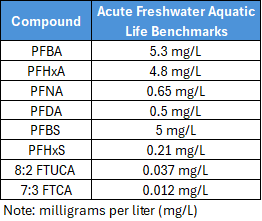How are PFAS impacting ecological investigations?
Navigating the Changing Landscape of Ecological Risk Investigations of Per- and Polyfluoroalkyl Substances
Authored by: Sean Weatherwax, CSE
Per- and polyfluoroalkyl substances (PFAS) in the environment and their potential impacts on human health are a growing focus of environmental concern throughout the country. Much of the focus from responsible parties and regulators has been on how to evaluate the risk PFAS pose to human health. However, as the extent of these emerging contaminants becomes clear, a better understanding is needed on the impact PFAS pose to ecological receptors as well.
In September of 2024, the United States Environmental Protection Agency (USEPA) released the final “Recommended Aquatic Life Criteria and Benchmarks for Select PFAS.” The criteria and benchmarks published by the USEPA included freshwater aquatic life water quality criteria for short-term (acute) and long-term (chronic) exposure, and acute saltwater aquatic life benchmarks for perfluorooctanoic acid (PFOA) and perfluorooctane sulfonic acid (PFOS):

Along with values for PFOA and PFOS, the USEPA also published acute freshwater aquatic life benchmarks for eight additional PFAS, as per the chart below:

What does this mean for Roux’s clients?
The release of PFAS criteria and benchmarks marked the first non-draft ecological values released by the USEPA for PFAS compounds. However, as the extent of PFAS in the environment has become better understood, other state and federal agencies have begun to promulgate ecological criteria, benchmarks, and toxicity values to aid in the investigation of potential impacts associated with PFAS in several media, including soil, sediment, surface water, and fish tissue. In many cases, multiple values for the same compound and media have been developed, which may vary by several orders of magnitude.
As clients work to understand the extent of human health impacts associated with PFAS at their sites, agencies are starting to require the consideration of ecological impacts. Understanding which criteria and benchmarks apply to a site will become more complicated as the number of available ecological benchmarks and criteria increases. As such, environmental investigations are beginning to see more of a need for technical experts who can help with evaluating impacts to both human health and ecological receptors.
What can Roux do to help?
Experts with Roux’s Ecological Risk Assessment (ERA) practice are actively tracking the release of new ecological values and guidance documents pertaining to PFAS compounds from both state and federal agencies. This tracking, combined with Roux’s extensive experience with the evaluation and selection of ecological values for use in site investigation, characterization, and remediation, allows Roux to assist our clients in understanding when and how to best assess the ecological risk associated with PFAS impacts in the environment. Roux’s ERA team regularly works alongside our experts in the Human Health Risk Assessment and traditional site investigation and remediation practice areas, to ensure that our clients are being served with the most up to date information related to PFAS.
The following are examples of services that Roux’s experts can provide to support ecological investigations related to PFAS:
- Development of ecological conceptional site models;
- Selection of applicable ecological values for use in site and ecological remedial investigations of PFAS-related impacts;
- Collection and analysis of environmental media samples including soil, sediment, surface water, and porewater; and
- Ecological risk assessment, including food chain modeling and toxicity sampling.
Do you need to develop a strategy to manage the ever-changing PFAS regulatory landscape? Please reach out below to hear from one of our experts.
